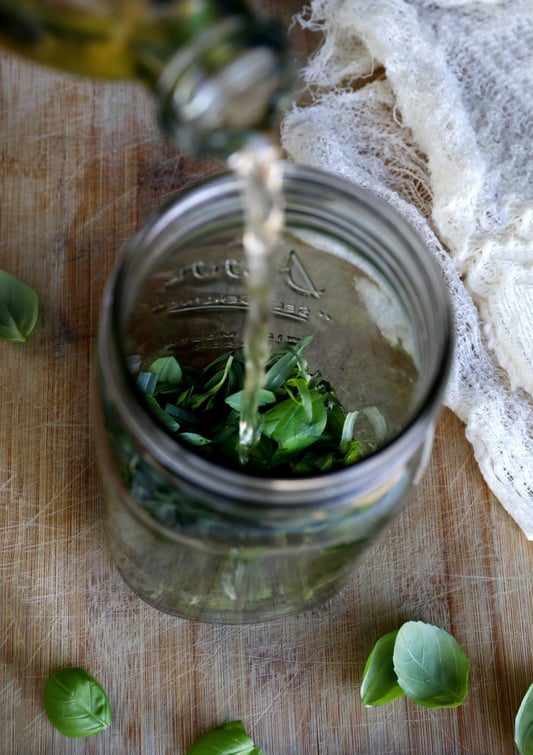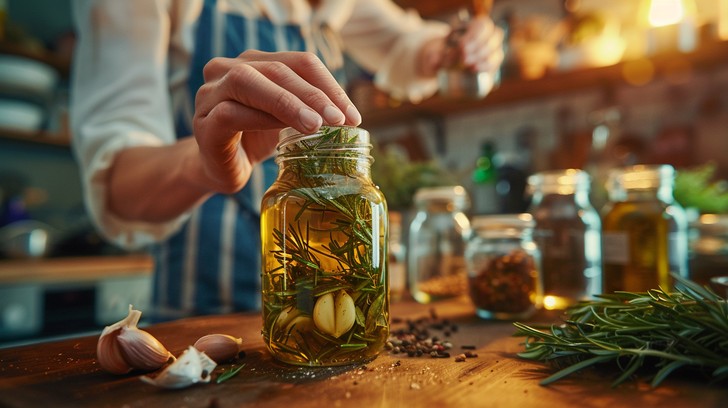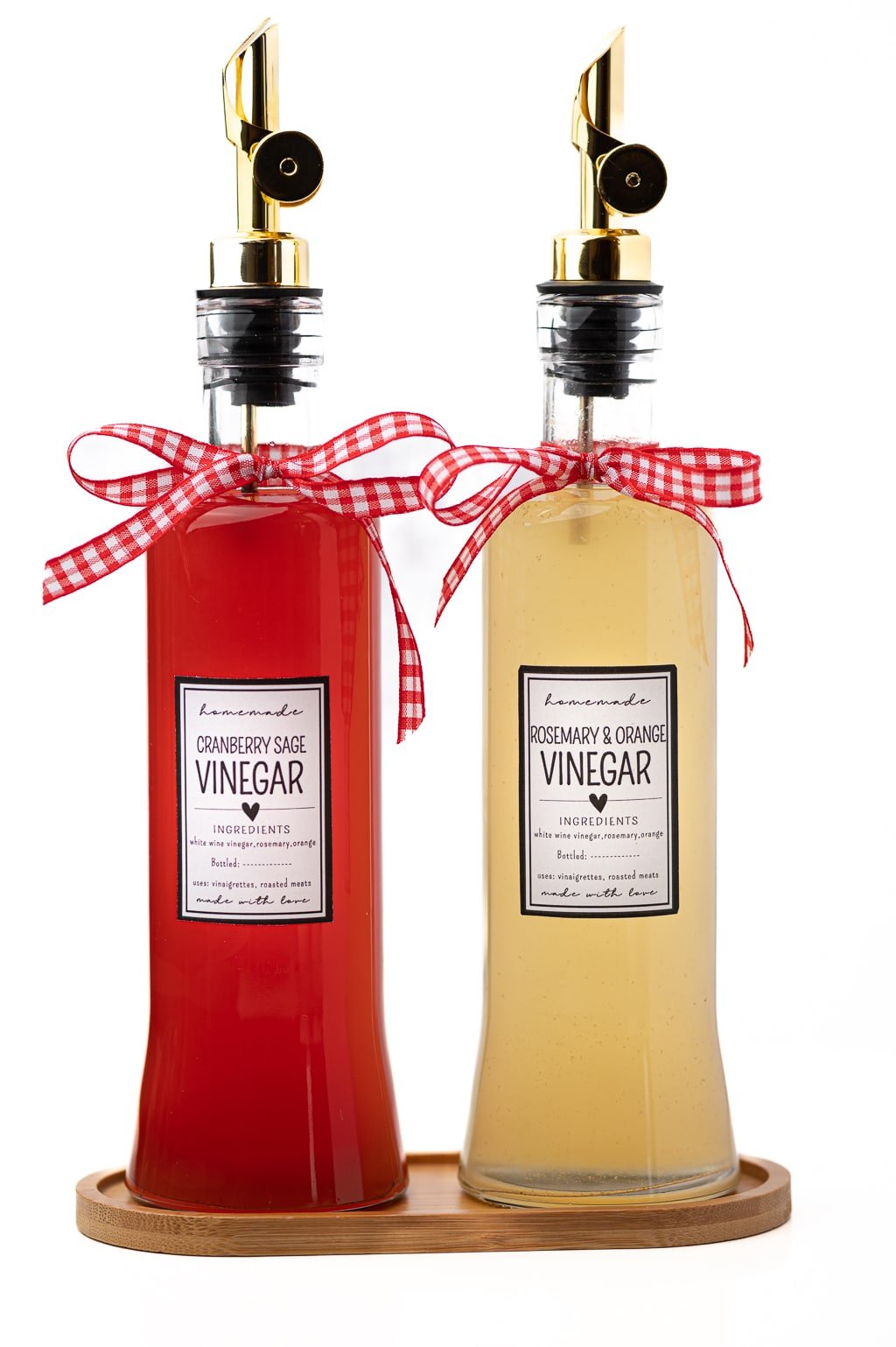
Herbal Harmony: Creative Ways to Utilize Your Garden’s Bounty
The aroma of your herb garden is intoxicating, isn’t it? The sun-drenched leaves, releasing their fragrant oils with every gentle breeze... But what if you could capture that essence and bring it beyond the kitchen, into your home and daily life?
This isn't just about adding flavor to your meals. We'll explore 5 unique and unexpected ways to use your homegrown herbs to enhance your homestead, from natural cleaning solutions to soothing self-care rituals. Prepare to unlock the hidden potential of your garden, transforming it into a powerhouse of natural solutions for a healthier, more sustainable, and aromatic existence. Get ready to dive into the world of creative herbal homesteading!

Natural Cleaning Power: Herbal Infused Vinegar
Tired of harsh chemicals and synthetic fragrances in your cleaning products? There's a better way – a way that harnesses the natural cleaning power of herbs and the solvent properties of vinegar. Using herbs for cleaning is not only eco-friendly but also fills your home with delightful, natural aromas, aligning perfectly with a "sustainable home" ethos. The science behind this lies in the volatile oils within the herbs, which possess antibacterial, antiviral, and antifungal properties. Vinegar, a mild acid, helps to further disinfect surfaces and cut through grease.
Here's how to make your own herb-infused vinegar:
- Choose your herbs: Lavender, rosemary, thyme, mint, and lemon balm are excellent choices. Consider what scents you enjoy and what cleaning properties you're seeking. Rosemary, for example, is known for its degreasing abilities.
- Pack a clean jar: Fill a clean glass jar (mason jars work perfectly for this "farmhouse life" project) about halfway with your chosen herbs.
- Cover with white vinegar: Pour white vinegar (5% acidity) over the herbs, ensuring they are completely submerged.
- Steep for 2-4 weeks: Seal the jar tightly and store it in a cool, dark place for 2-4 weeks, allowing the vinegar to extract the herbs' beneficial compounds. Shake the jar occasionally.
- Strain: After the steeping period, strain the vinegar through a cheesecloth or fine-mesh sieve to remove the herbs.

Herb-infused vinegar in mason jars with handmade labels for easy identification of herbs and purpose.
Uses for Herb-Infused Vinegar:
- All-Purpose Cleaner: Dilute the infused vinegar with water (1:1 ratio) in a spray bottle and use it to clean countertops, sinks, and other surfaces.
- Window Cleaner: Mix infused vinegar with water (1:3 ratio) for a streak-free window cleaner.
- Laundry Booster: Add 1/2 cup of infused vinegar to your washing machine during the rinse cycle to brighten clothes and remove odors.
Safety Precautions: Always dilute herb-infused vinegar before use, especially on sensitive surfaces. Avoid using vinegar on natural stone surfaces like marble or granite.
Herbal Remedies: Soothing Salves for Everyday Aches
Beyond cleaning, your herb garden can be a source of natural remedies for everyday aches and pains. The medicinal properties of herbs have been recognized for centuries, and creating your own salves allows you to tap into this ancient wisdom. Many herbs contain compounds that reduce inflammation, soothe irritated skin, and promote healing. This is a great way to cozy up your homestead.
Consider these herbs for your homemade salves:
- Lavender: Known for its calming and anti-inflammatory properties, lavender is excellent for soothing skin irritations, burns, and insect bites.
- Chamomile: Another calming herb, chamomile is effective for reducing inflammation and promoting relaxation.
- Calendula: A potent skin healer, calendula promotes wound healing, reduces inflammation, and soothes dry, irritated skin.
- Comfrey: Known for its cell-proliferant abilities.
Basic Herbal Salve Recipe:
- Infuse Oil: Gently heat 1 cup of olive oil or coconut oil with 1/2 cup of dried herbs in a double boiler or on very low heat for 2-4 hours. Alternatively, you can infuse the oil by placing it in a jar with the herbs and letting it sit in a sunny location for several weeks.
- Strain the Oil: Strain the infused oil through a cheesecloth or fine-mesh sieve to remove the herbs.
- Melt Beeswax: In a double boiler, melt 1-2 ounces of beeswax (the amount of beeswax will determine the firmness of the salve; use more for a firmer salve).
- Combine: Remove from heat and slowly stir the infused oil into the melted beeswax.
- Add Essential Oils (Optional): Add a few drops of essential oils for added therapeutic benefits and fragrance.
- Pour into Containers: Pour the mixture into small tins or jars and let cool completely.

A small tin of homemade herbal salve is opened, showing a finger dipping into the salve.
Important Warnings and Disclaimers: Consult a healthcare professional before using herbal remedies, especially if you are pregnant, breastfeeding, or have any underlying health conditions. Perform a patch test before applying the salve to a large area of skin to check for any allergic reactions.
DIY Beauty Infusions: Herbal Hair Rinses and Toners
Elevate your self-care routine with the natural goodness of herbs. Herbs can enhance your hair and skin care routines, providing gentle and effective nourishment without harsh chemicals. "Cozy living" extends to the products you use on your body, and creating your own herbal infusions allows you to control the ingredients and tailor them to your specific needs.
Herbal Hair Rinse Recipes:
- Brew a Strong Herbal Tea: Use about 2-4 tablespoons of dried herbs per cup of boiling water. Steep for 20-30 minutes.
- Rosemary: Enhances dark hair and promotes hair growth.
- Chamomile: Brightens light hair and soothes the scalp.
- Nettle: Strengthens hair and reduces hair loss.
- Let Cool: Allow the tea to cool completely.
- Use as a Final Rinse: After shampooing and conditioning, pour the herbal tea over your hair as a final rinse. Do not rinse out.
Herbal Toner Recipes:
- Steep Herbs: Place 1-2 tablespoons of dried herbs in a jar and cover with 1 cup of witch hazel or apple cider vinegar.
- Rose Petals: Soothes and hydrates skin.
- Lavender: Calms and reduces inflammation.
- Mint: Refreshes and tones skin.
- Strain and Store: Steep for 1-2 weeks, then strain and store in a glass bottle.
- Apply to Face: Apply to your face with a cotton pad after cleansing.

A woman is using a pitcher to pour tea onto her hair.
Natural Pest Control: Herbal Deterrents for Garden and Home
Protect your garden and home from unwanted pests with the natural power of herbs. Certain herbs contain volatile compounds that repel insects, making them a safe and effective alternative to chemical pesticides. This aligns with "organic gardening" principles and promotes a healthier environment for you and your family. The science behind this lies in the specific compounds within the herbs that interfere with insect sensory systems, disrupting their ability to find food or lay eggs.
Herbs for Pest Control:
- Mint: Repels ants, aphids, and cabbage moths.
- Basil: Repels flies and mosquitoes.
- Rosemary: Repels cabbage moths, bean beetles, and carrot flies.
- Lavender: Repels moths, fleas, and mosquitoes.
- Marigolds: Repel nematodes and other soil pests.
Using Herbs in the Garden:
- Companion Planting: Plant pest-repelling herbs near susceptible plants to deter pests.
- Herbal Sprays: Create an herbal spray by steeping herbs in water and spraying the mixture on plants.
- Dried Herbs as Mulch: Sprinkle dried herbs around plants to repel pests.
Using Herbs Indoors:
- Herbal Sachets: Fill sachets with dried herbs and place them in closets, drawers, and other areas to repel moths and other insects.
- Herbs Near Entry Points: Place potted herbs near doors and windows to deter insects from entering your home.
- Herbal Floor Washes: Add herbal infusions to your floor cleaning solution to repel insects.
Creative Garden Decoration: Herbal Topiary and Living Walls
Beyond their practical uses, herbs can also be used to create beautiful and fragrant garden decorations. The diverse textures, colors, and fragrances of herbs make them ideal for adding visual interest to your outdoor spaces. Let your creativity flow and incorporate herbs into unique "backyard projects" that enhance your "farmhouse life" aesthetic.
Herbal Topiary Instructions:
- Choose a Wire Frame: Select a wire frame in the desired shape (e.g., ball, cone, or heart).
- Gather Cuttings: Take cuttings from rosemary, thyme, or lavender.
- Insert Cuttings: Insert the cuttings into the wire frame, securing them with floral wire or twine.
- Water Regularly: Water the topiary regularly to keep the cuttings moist.

Herb topiaries sitting in a garden. Other herbs sit nearby in pots.
Herbal Living Wall Ideas:
- Pallet Planters: Repurpose a wooden pallet into a vertical planter for herbs.
- Stacked Pots: Create a living wall by stacking pots filled with herbs.
The Big Question: What is your biggest gardening challenge? Let us know in the comments!
Herbal Homestead Harmony
As you’ve discovered, your herb garden is more than just a source of culinary delight. It's a wellspring of natural solutions for a healthier, more sustainable, and more beautiful homestead.
As you prepare for autumn, now is the perfect time to harvest and preserve your herbs for these exciting projects. Don’t be afraid to experiment and discover your own unique ways to incorporate herbs into your daily life. It is a perfect time to begin cozying up your space!
Share your own herbal creations in the comments below! What's your favorite way to use homegrown herbs? Tag us in your photos on Instagram @BetterHomesAndHarvests using #HerbalHomesteading. Have any questions? Ask the expert in the comment section and we will happily assist!